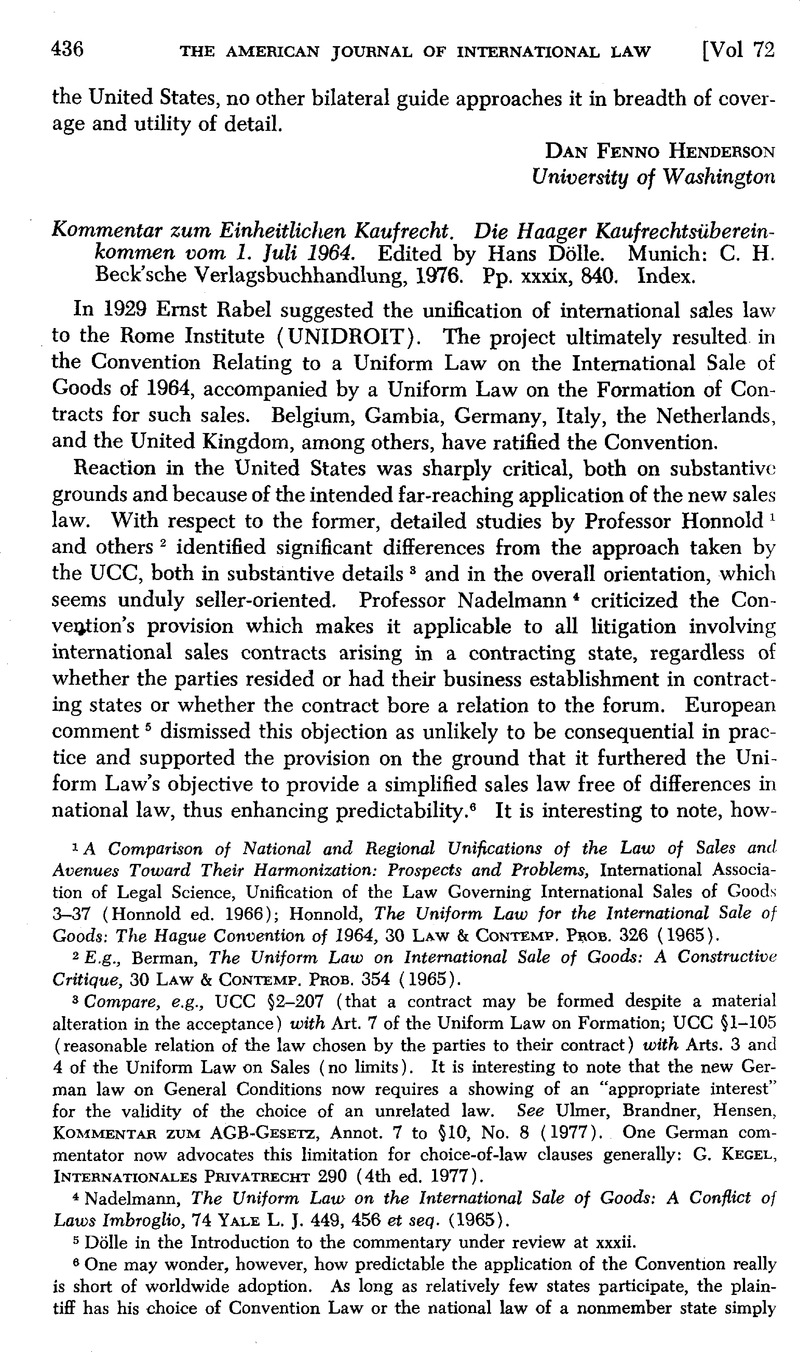No CrossRef data available.
Published online by Cambridge University Press: 27 February 2017

1 A Comparison of National and Regional Unifications of the Law of Sales and Avenues Toward Their Harmonization: Prospects and Problems, International Association of Legal Science, Unification of the Law Governing International Sales of Goods 3-37 (Honnold ed. 1966); Honnold, , The Uniform Law for the International Sale of Goods: The Hague Convention of 1964, 30 Law & Contemp. Prob. 326 (1965)CrossRefGoogle Scholar.
2 E.g., Berman, , The Uniform Law on International Sale of Goods: A Constructive Critique, 30 Law & Contemp. Prob. 354 (1965)CrossRefGoogle Scholar.
3 Compare, e.g., UCC §2-207 (that a contract may be formed despite a material alteration in the acceptance) with Art. 7 of the Uniform Law on Formation; UCC §1-105 (reasonable relation of the law chosen by the parties to their contract) with Arts. 3 and 4 of the Uniform Law on Sales (no limits). It is interesting to note that the new German law on General Conditions now requires a showing of an “appropriate interest” for the validity of the choice of an unrelated law. See Ulmer, Brandner, Hensen, Kommentar Zum Agb-Gesetz, Annot. 7 to §10, No. 8 (1977). One German commentator now advocates this limitation for choice-of-law clauses generally: G. Kegel, Internationales Privatrecht 290 (4fh ed. 1977).
4 Nadelmann, , The Uniform Law on the International Sale of Goods: A Conflict of Laws Imbroglio, 74 Yale L. J. 449, 456 et seq. (1965)CrossRefGoogle Scholar.
5 Dolle in the Introduction to the commentary under review at xxxii.
6 One may wonder, however, how predictable the application of the Convention really is short of worldwide adoption. As long as relatively few states participate, the plaintiff has his choice of Convention Law or the national law of a nonmember state simply by selecting his forum. Furthermore, as Dolle himself acknowledges (supra n. 5, at xxxvi), even courts of contracting states will still resort to national law notions for the purpose of filling gaps. Article 17 of the Uniform Sales Law, which provides that a court shall be guided by the general principles of the Uniform Law, is of much less help than the similar provision of UCC §1-102(1) given the greater diversity of legal systems which furnish the background. The author of the comments to Article 1 of the Uniform Sales Law (Prof. Herber) also disagrees with the editor and endorses the American objection: Annot. 7 preceding Arts. 1-8 of the Uniform Sales Law.
7 Article III of the Sales Convention permits contracting states to limit the application of the Convention to contracts between parties having their habitual residence or place of business in contracting states. Gambia, Germany, the Netherlands, San Marino, and the United Kingdom invoked this provision. Article IV of the Sales Convention permits contracting states to exclude the application of Article 2 of the Uniform Sales Law which provides that the rules of private international law of contracting states shall not be applied to international sales contracts if they participate in other international agreements providing (different) choice-of-law rules. The intended reference is to the Hague Conference Convention of 1955 on the law applicable to international sale of goods. Belgium and Italy invoked Article IV.
8 E. von Caemmerer, H. H. Eberstein, R. Herber, U. Huber, W. Junge, H. G. Leser, K. H. Neumayer, G. Reinhart, P. Schlechtriem, H. Stoll, H. Srumpf, E. Wahl, and H. Weitnauer.
9 See supra n. 5 and 6.
10 UNCITRAL Y.B. 89 et seq.(1977).
11 Id., at 88-89.